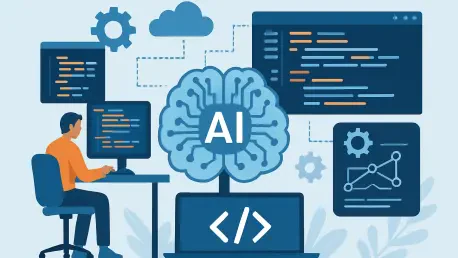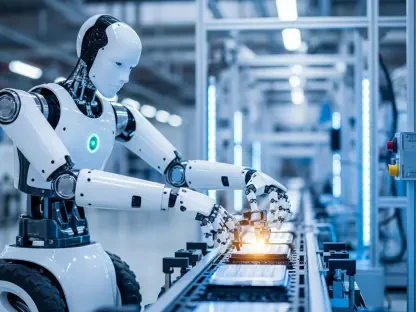Imagine a world where software development not only accelerates at an unprecedented pace but also delivers staggering financial benefits to organizations across the globe, marking a new era of innovation. A recent global survey conducted by a leading research firm has unveiled a transformative shift in the industry, revealing that artificial intelligence (AI) is reshaping how software is created, tested, and deployed. With thousands of C-level executives weighing in, the findings point to remarkable economic gains and productivity boosts driven by AI integration. This technological leap is not just a trend but a fundamental change, positioning software innovation as a cornerstone of business success. As organizations increasingly prioritize AI-driven tools, the balance between machine efficiency and human ingenuity emerges as a critical focus. This exploration delves into the profound impacts, emerging challenges, and future implications of AI in software development, highlighting a dynamic era of growth and adaptation.
Economic Impacts of AI in Development
The financial benefits of incorporating AI into software development are nothing short of extraordinary, as evidenced by survey results showing annual savings of around $28,249 per developer. This impressive figure stems from a reported 48% surge in developer productivity, allowing teams to accomplish more in less time. Beyond individual gains, a significant 58% of surveyed executives noted tangible business growth tied to software innovation over the past year, with an estimated revenue increase of 44%. Such numbers underscore how AI is not merely a tool for efficiency but a catalyst for organizational expansion. With 91% of leaders identifying software innovation as a core business priority, the strategic importance of AI adoption is clear. Moreover, a substantial 82% of organizations are prepared to allocate over half of their IT budgets to these initiatives, signaling a deep commitment to leveraging technology for competitive advantage and long-term profitability.
Further emphasizing the economic ripple effect, the survey highlights how organizations are aligning development efforts with measurable business outcomes. Around 90% have adopted frameworks that tie development activities directly to key performance indicators such as growth and problem-solving capabilities. Metrics like developer productivity and business expansion, each cited by approximately 40% of respondents, serve as benchmarks for success. This structured approach ensures that AI-driven innovation translates into real-world value, rather than remaining a theoretical advantage. The willingness to invest heavily in software development also reflects a broader recognition that staying ahead in a digital economy requires continuous adaptation. As AI tools streamline processes, from coding to deployment, the financial justification for their adoption becomes increasingly undeniable, paving the way for sustained economic benefits across industries.
The Rise of Agentic AI and Human Collaboration
A striking prediction from the survey indicates that agentic AI, capable of autonomously handling tasks like code writing and testing, is expected to become the industry standard within the next three years, according to 89% of executives. This shift promises to free developers from repetitive workloads, enabling a sharper focus on creative problem-solving and strategic innovation. The potential for AI agents to manage complex processes autonomously marks a significant evolution in software development practices. However, this technological advancement does not diminish the human role; rather, it redefines it. An overwhelming 99% of leaders affirm the enduring value of human contributions, with 73% advocating for a balanced partnership where human input remains at least equal to AI. This synergy ensures that while machines handle routine tasks, human insight drives the overarching vision and innovation.
Complementing this perspective, the survey reveals that human strengths such as creativity and strategic thinking, valued by 39% of respondents, are seen as irreplaceable components of the development process. Even as AI capabilities expand, 90% of organizations continue to hire developers to accelerate application creation, underscoring the need for human expertise in navigating nuanced challenges. This balanced approach highlights a future where AI acts as a powerful ally rather than a replacement for human talent. The emphasis on collaboration also extends to how teams are structured, with efforts to integrate AI tools into workflows while preserving the unique contributions of developers. As agentic AI gains traction, the industry appears poised to redefine productivity through a harmonious blend of technological efficiency and human ingenuity, ensuring that innovation remains both cutting-edge and deeply human-centric.
Challenges and Governance in AI Adoption
Despite the enthusiasm surrounding AI in software development, significant challenges loom large, with cybersecurity threats topping the list of concerns for 52% of executives. Data privacy and security issues follow closely at 51%, alongside governance challenges cited by 45% of respondents. These risks underscore the complexities of integrating advanced AI tools into existing systems, particularly as agentic AI scales code creation and expands DevOps pipelines. To mitigate these concerns, proactive measures are being taken, with 53% of organizations implementing regulatory-aligned governance frameworks. Additionally, 52% are crafting internal AI policies, and 47% are conducting third-party audits to ensure responsible usage. These steps reflect a cautious yet determined approach to harnessing AI’s potential while safeguarding critical assets and maintaining trust in digital ecosystems.
Another pressing issue lies in the operational and skill-based hurdles that accompany AI adoption. The survey notes that managing an increasing number of DevOps pipelines poses logistical difficulties as AI accelerates development cycles. Equally critical is the need for workforce adaptation, with 92% of executives emphasizing the importance of retraining employees to collaborate effectively with AI tools. This includes preparing for the rise of citizen developers who leverage accessible coding platforms to prototype applications swiftly. Such shifts demand a cultural and technical recalibration within organizations to ensure seamless integration. Addressing these challenges requires not only robust policies but also a commitment to continuous learning and adaptability. As AI reshapes the development landscape, the focus on governance and upskilling will be pivotal in turning potential risks into opportunities for innovation and growth.
Navigating the Future with Strategic Balance
Reflecting on the survey’s insights, it becomes evident that AI has already begun to redefine software development by delivering substantial cost savings and productivity boosts. The commitment to software innovation as a business priority is unmistakable, with organizations achieving remarkable revenue growth through AI-driven initiatives. Yet, the journey is not without obstacles, as concerns over security, privacy, and governance demand careful attention and robust solutions. The past shows a clear trend toward a collaborative future where human creativity and AI efficiency intertwine to drive progress. Looking ahead, organizations must prioritize strategic planning to address skill gaps through targeted training programs. Strengthening governance frameworks will be essential to mitigate risks while maximizing AI’s benefits. As the industry continues to evolve, maintaining a balance between technological advancement and human oversight will ensure that the transformative power of AI is harnessed responsibly and sustainably.









